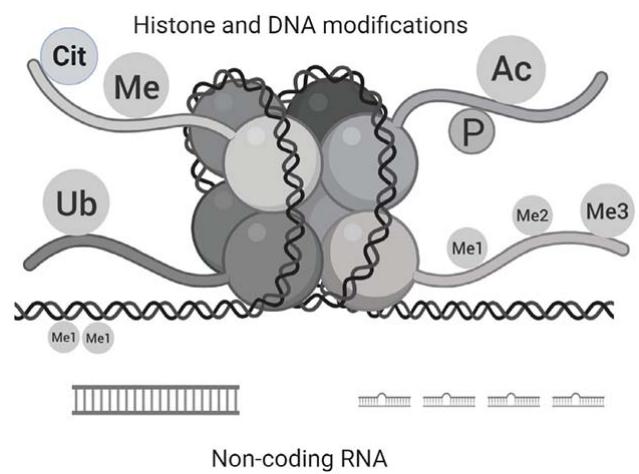Immunomics Services
Immune Cell Epigenomics Analysis
Epigenomics dynamically regulates gene expression and thus alters the epigenetic state of genes, which may influence our immune system. CD Genomics provides services to analyze the epigenomics of target samples to help our clients understand the epigenetic impact on the immunomics.
Epigenomics Effects on the Immune System
Epigenomics is the study of the complete epigenetic modification of the cellular genetic material, also known as the epigenome. DNA methylation and histone modifications are by far the major epigenetic mechanisms recognized. In addition, microRNAs (miRNAs) are widely recognized as important epigenetic controllers of gene expression.
 Fig.1 Major categories of epigenetic
regulation. (Antrobus, M., et al., 2021)
Fig.1 Major categories of epigenetic
regulation. (Antrobus, M., et al., 2021)
Complex DNA and histone modifications result in changes in the overall conformation and structure of chromatin between a closed inactive state and a loose/open active conformation, thereby affecting gene transcription in the immune pathway. The analysis of epigenomics facilitates the unraveling of the pathogenesis of multiple immune-related diseases.
-
Epigenomics Effects on Immune System in Food Allergy
Food allergy is a multifactorial disease. The influence of the environment on the susceptibility and occurrence of food allergies is achieved through epigenetic mechanisms. Through epigenomic analysis, vitamin D insufficiency is associated with an increased risk of food allergies, such as peanut and egg allergies. High vitamin D levels are associated with lower methylation levels in the thymic stromal lymphopoietin (TSLP) enhancer region, resulting in elevated TSLP mRNA expression, which is an epithelial cell-derived cytokine associated with allergic diseases. -
Epigenomics of the Immune System in Lupus Patients
Lupus is a chronic autoimmune disease with an incompletely understood etiology. There is evidence of reduced levels of DNA methylation in multiple cell types in lupus patients. Methylation defects extend to the regulatory sequence of the angiotensin-converting enzyme 2 (ACE2) gene, which may lead to ACE2 overexpression in lupus patients. SARS-CoV-2 binds to target host cells via ACE2. Thus, lupus increases the likelihood of SARS-CoV-2 infection.
Our Services
The immune system is an important barrier of defense against foreign antigens. Therefore, the analysis of epigenetic changes can provide important information for the mechanistic study and treatment of multiple diseases, especially beneficial for the study of autoimmune diseases and tumors.
CD Genomics provides professional epigenomics analysis services in immunomics for clients worldwide. Epigenomics services can be divided into two categories based on the content of the study, which is the chemical modification of DNA/RNA and DNA/RNA-protein interactions. The services we provide, including but not limited to the following three.
- Whole Genome Bisulfite Sequencing (WGBS) is a combination technique of sodium bisulfite treatment and high-throughput sequencing to perform highly accurate methylation studies at the genome-wide level and to construct a fine-grained genome-wide DNA methylation map.
- Chromatin Immunoprecipitation Sequencing (ChIP-Seq) is an epigenetic research technique that combines chromatin immunoprecipitation with second-generation sequencing to efficiently detect DNA and protein interactions on a genome-wide scale. ChIP-Seq is commonly used to study both transcription factor binding sites and histone-specific modification sites.
- RNA Immunoprecipitation Sequencing (RIP-seq) maps the intracellular RNA-protein binding sites. After precipitation of protein-bound RNA or modified RNA, high-throughput sequencing of the whole transcriptome is performed on the region or species of RNA bound by the specific protein, and differences can be compared between multiple samples.
Workflow

Experimental Design
Sample Testing
Library Construction
Sequencing Experiments
Data Analysis
Project Delivery
Why Choose Us
| High Sensitivity - Single base resolution for accurate detection of the methylation status of each cytosine. | |
| High Efficiency - Accurate acquisition of whole genome methylation sites and rapid experimentation with multiple samples. | |
| Analysis Capability - Combine multiple technologies to comprehensively analyze the epigenetic status of samples. |
As a pioneer in immunomics, CD Genomics has focused on conducting immune epigenomic studies for many years. Through collaboration and communication with our clients, we resolve bottlenecks in projects and advance mechanistic studies of multiple immune-related diseases. Please contact us for more information.
Reference
- Antrobus, M., Cuttell, S., & Machado, L. R. (2021). Epigenetics, exercise, and the immune system. In Epigenetics of Exercise and Sports (pp. 183-199). Academic Press.
